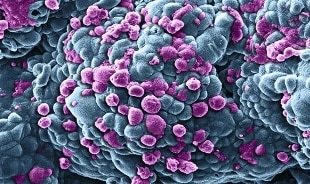Share
25 August 2021 Italian researchers discover a new molecule that helps tumors to be more aggressive and that could become the target of new anticancer therapies.
The molecule, called Unc5b-d8, is formed following an anomaly in a normal 'cut and sew' mechanism of the genetic information of blood vessel cells, the 'alternative splicing', which allows, starting from the same gene, to produce different versions of the same protein.
The discovery, as part of a study supported by Airc and directed by Claudia Ghigna, of the Luigi Luca Cavalli-Sforza Institute of Molecular Genetics of the National Research Council of Pavia (Cnr-Igm), in collaboration with various research centers and Italian and international universities, was published in the journal Nature Communications.
"This new variant helps make cancer more aggressive and represents a new tumor marker and possible molecular target," explains Ghigna.
The research shows how, through the mechanism of 'alternative splicing', blood vessel cells produce a variant of the Unc5b protein never described before, Unc5b-d8.
"Alternative splicing is a so-called 'cut and sew' mechanism, which allows the building blocks of human genes to be assembled in various ways and generate different proteins from the same initial genetic sequence," continues Ghigna. "The research findings turn the spotlight on the still poorly understood role of alternative splicing in the development of tumor blood vessels," he adds.
The discovered variant offers an excellent diagnostic and prognostic tool, which could be exploited both as a new marker of tumor angiogenesis and as a possible molecular target for more effective anti-cancer therapies, he concludes.

